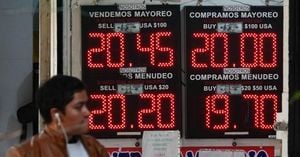South Africa is navigating a complicated economic landscape following the recent announcement of steep import tariffs by the United States on its vehicles and automotive components. In a measured response, the South African government is prioritizing diplomacy and trade diversification, rather than retaliation, as it seeks to mitigate the impact of these tariffs.
On April 9, 2025, U.S. President Donald Trump implemented a blanket tariff of 30% on South African imports, particularly targeting the automotive sector. This decision has raised concerns among South African officials, particularly Trade Minister Parks Tau, who confirmed that discussions with U.S. authorities are underway to address the implications of these tariffs.
Despite the significant tariffs, it is important to note that South Africa's trade relationship with the U.S. is relatively limited, with the U.S. accounting for less than 9% of South Africa's total exports. In 2024, South Africa exported just under $3 billion worth of precious metals and stones to the U.S., alongside $506 million in iron and steel. Notably, many of South Africa's largest exports, including platinum, gold, and certain chemicals, are exempt from these new tariffs, which is a relief for the nation’s economy.
The automotive sector, however, faces a more challenging situation. In 2024, South Africa exported over $1.4 billion worth of vehicles to the U.S., which are now subject to the new tariffs. This could potentially squeeze demand and affect production volumes in key automotive hubs like Gqeberha and East London. Analysts suggest that while the tariffs pose a challenge, the automotive industry is globally integrated and diversifying its markets. South African-assembled vehicles are increasingly being directed toward Europe and emerging markets in Africa and Asia.
In a bid to showcase resilience, the South African government has ruled out retaliatory tariffs. Minister Tau stated, "We believe in constructive engagement and will be seeking discussions with U.S. authorities," emphasizing the importance of maintaining trade partnerships amidst policy shifts.
National Treasury projections indicate that the tariffs may result in a potential GDP reduction of less than 0.1 percentage points in a baseline scenario, and up to 0.7 percentage points in a worst-case scenario. These figures suggest that the economic impact, while significant, is manageable within South Africa's broader macroeconomic context.
Another sector that may feel the pressure is agriculture, with new tariffs potentially affecting South African fruit, wine, and food exports. However, the agricultural sector is experiencing rising export volumes, particularly in citrus fruits. Experts believe that while U.S. buyers may face higher prices, the demand for premium South African produce is unlikely to collapse, as growers have also increased exports to Europe, the Middle East, and Asia, diversifying their customer base.
South Africa's strategic position as the largest global exporter of platinum, manganese, and chrome, along with being a top-10 exporter of gold, coal, and iron ore, plays a crucial role in its trade resilience. The country is also enhancing its trade relationships with markets in India, Brazil, the Gulf states, and Southeast Asia, further solidifying its global trade presence.
In a related development, markets reacted positively to Trump's announcement of a temporary pause on punitive tariffs exceeding 10% against major trading partners, including South Africa. The rand, which had previously hit record lows against the U.S. dollar, gained 2% following the news, settling around R19.30/$, although it remains under pressure due to ongoing global trade tensions.
Despite the temporary reprieve, the 10% global tariff on exports to the U.S. remains in effect, and the uncertainty surrounding Trump's administration continues to keep investors on edge. The potential end of South Africa's participation in the African Growth and Opportunity Act (AGOA) adds another layer of complexity to the situation, as this program provides duty-free access to the U.S. market for many products from eligible sub-Saharan African countries.
Trade Minister Tau has indicated that salvaging AGOA may be difficult, with talks planned for June or July to discuss the future of this trade pact. The expiration of AGOA in September 2025 raises further concerns for South African exporters.
Economists have pointed out that the tariffs imposed by the U.S. may be a strategic move to encourage American companies to relocate their operations back to the United States. This could have significant implications for South African industries, particularly in the automotive and agriculture sectors, which are already facing cost pressures and potential job losses.
As South Africa grapples with these challenges, the government is intensifying efforts to diversify its export destinations and build resilience within its domestic supply chains. This includes reducing the cost of doing business and increasing the competitiveness of its economy.
In conclusion, while the U.S. tariffs represent a significant challenge for South Africa, the country's response reflects a commitment to diplomacy and long-term trade diversification. As it navigates this complex landscape, South Africa remains focused on maintaining its position as a stable and strategic trade partner in a fragmented global economy.




